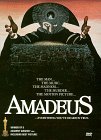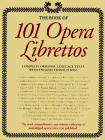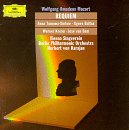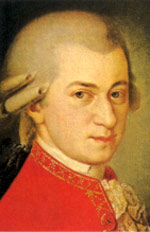|
Mozart - the absolute wonder of the world
Wolfgang Amadeus Mozart was born into a world filled with music on January 27, 1756 in the town of Salzburg, Austria. His father, Leopold Mozart, was a professional musician and scholar who not only taught his children music, but assumed responsibility for all of their education.
Leopold Mozart began giving music lessons to Mozart's sister, Nannerl, when she was seven. Wolfgang, who was barely three years old at the time, became very interested in the lessons. He would entertain himself for hours pressing the clavier (precursor of the piano) keys and delighting in the sounds they produced. Leopold was soon also giving Wolfgang music lessons.
By the age of four, he could memorize little pieces and play them perfectly. At five years of age, he could compose short pieces. His ear was already so keen that he was able to tell his elders if their violins were a quarter tone out of tune.
Leopold Mozart saw the talents of his children as a way to gain fame and fortune for the family. At the age of six, Wolfgang set out with his family on a musical tour of Europe. Wolfgang and Nannerl became known as the "Wonder Children" and were in great demand, amazing and entertaining all the courts of Europe.
Wolfgang was very charming as a youngster. While in Vienna at the home of Empress Maria Theresa, he slipped and fell upon a polished floor. Maria Antoinette, who would later become the Queen of France, came to his rescue. Wolfgang was so delighted that he pronounced, "Oh, how pretty you are! When I grow up, I will marry you."
As the novelty of the children declined, Leopold Mozart was forced to discontinue the tours. The many years of travel over unpaved roads in horse-drawn carriages had taken their toll on Wolfgang's health. A severe case of smallpox nearly killed him and forever affected his health. In later years, Mozart only traveled out of financial need. This, unfortunately, proved to be more often than he had hoped.
 Mozart began composing in earnest. At the age of twelve, his first opera was produced, Bastien und Bastienne. Another opera followed a year later, La Finta Semplice. He was soon considered to be a successful composer by the public, but had not yet secured a job providing financial security.
Mozart began composing in earnest. At the age of twelve, his first opera was produced, Bastien und Bastienne. Another opera followed a year later, La Finta Semplice. He was soon considered to be a successful composer by the public, but had not yet secured a job providing financial security.
In 1770, he received employment in the court of Archbishop Hieronymous of Salzburg. The ten years in this position proved to be very unhappy for Mozart. He was subject to the whims of the Archbishop who treated him harshly, but for whom he was expected to perform radiantly at private concerts.
The social position of the musician was at its lowest. He was forced to live in the royal household and dine with the servants. Finally unable to withstand the mistreatment, Mozart asked to be released from the position. A large quarrel resulted and, although Mozart gained his freedom, the powerful Archbishop was now his enemy. Mozart again found himself without a job and money.
He always felt frustrated by the lack of appreciation for his talents as well as always being underpaid. When he did have money, however, he lived recklessly, and never saved for times of need. He longed not to have to beg for favors from nobility or to give lessons to untalented students, but for a position which would free him from his financial worries and allow him to compose as he wished.
Composing music was the only thing that set him free from his worries. Composing was as natural and as much of a necessity to him as eating and sleeping. He could work and rehearse all day and night. His barber later related a story of the difficulty he would have trying to dress Mozart's hair, because he could never sit still. The moment an idea would occur to him, he would dash to the clavier, with the barber, hair ribbon in hand, running behind him. During Mozart's brief life, he produced an astonishing legacy of beautiful music: over 600 different compositions in a wide range of musical forms.
After his departure from the service of the Archbishop, Mozart was able to have some of his music published. He also began teaching students privately. This allowed him the financial security he felt he needed to marry Constanze Weber in 1782. They had six children, but only two boys survived.
Leopold Mozart, who felt Constanze to be "beneath his son," had not consented to the union and was horrified by his son's decision. Mozart dearly loved his father, but he was determined to marry Constanze. Much against his nature, he disobeyed his father. It has been said that although Leopold encouraged his son in his musical endeavors, he rarely let him make his own decisions. Mozart was, however, very dependent upon him and constantly sought his advice.
In the years following their marriage, Mozart was happy and experienced some professional success. He met and developed a relationship with the Austrian composer Joseph Haydn (1732-1809) whose music had inspired Mozart as a young boy. The friendship they shared was based on admiration and mutual respect and led to the enrichment of each man's music. The success of his operas, The Marriage of Figaro (1786) and Don Giovanni (1787) gave Mozart great satisfaction.
The year 1787, however, also marked the death of Mozart's beloved father. Fate was again filling his world with despair. He was once more very deep in debt and frequently ill, yet drove himself to fulfill his obligations. He began another series of tours in 1789 to try to earn a living.
Upon returning home, Emanuel Schikaneder, a theatrical manager and actor, approached Mozart with a libretto he had written for a magical opera based on an oriental fairy tale. Although Mozart was very ill, he feverishly began writing an opera with musical selections that were framed with spoken dialogue known as a German Singspiel or sung play. Mozart wrote the last notes of THE MAGIC FLUTE on September 29, 1791 and it premiered in Vienna on September 30, 1791 and it premiered in Vienna the very next day.
He was unable to enjoy the success of his new opera. Mozart collapsed from exhaustion after the premiere and his illness grew more serious. Death was near. During his final days, he was visited by a stranger who commissioned him to compose a Requiem Mass. In his deteriorating state, Mozart began to believe that the stranger was a messenger from heaven who came to give notice of his approaching end and that the Requiem was for himself. The mysterious visitor was actually sent by Count Walsegg whose wife had just passed away. A musician of little skill and even less merit, he intended to claim the work as his own to impress his friends.
Mozart died on December 5, 1791, before he could complete the Requiem. This phenomenal genius, so rich in talent, died a poor man at only thirty-five years of age. En route to his final resting place, a storm arose and all of his friends retreated. Only his faithful dog watched his master disappear into a common unmarked pauper's grave.
|









 View opera MAGIC FLUTE
View opera MAGIC FLUTE




